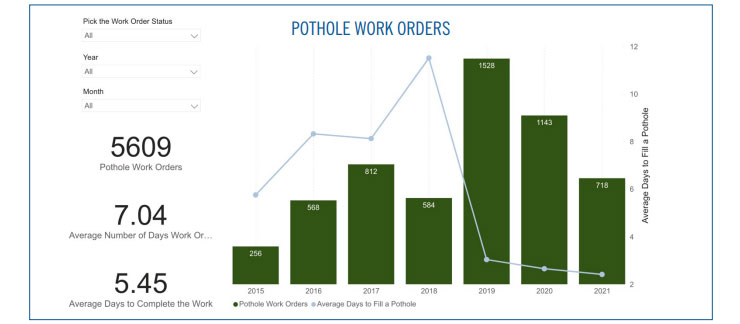Client Spotlight: Stockton, California
- Population: 300,000+
- Location: Central Valley of California
- Tyler Solution: Enterprise Data Platform
Challenge: Rallying Performance Improvement
Stockton, the 13th largest city in California, has tackled many opportunities and challenges over the years, from its founding during the 1840s’ Gold Rush to its plunge into a historic bankruptcy following the 2008 financial crisis.
When Harry Black joined Stockton as city manager in February 2020, he was humbled by the sacrifices made during the city’s recovery from insolvency. Through deep austerity measures, the city emerged from bankruptcy in 2015 to become one of the most fiscally solvent large cities in the United States.
But Stockton had lost five to seven years of economic growth. Functions such as efficient city services and effective communication with the public had been stagnating.
Black came to Stockton with a charge to address these challenges. He recognized Stockton and its city employees were poised for a strong renewal.
Black, a nationally recognized leader in the development of performance management systems for cities, knew the job he faced from his experiences as city manager for Cincinnati. Stockton’s renewal would hinge on rallying city staff around clear objectives, goals, strategies, and plans that are informed and measured by data.
Solution: Data-Empowered Public Sector Workers
Within three months, Black had created an Office of Performance & Data Analytics (OPDA), modeled on a similar office he started in Cincinnati. He hired Katie Regan, a program manager on Stockton’s enterprise resource planning implementation, as the office’s director.
Regan’s role was multifaceted. She was to establish and implement a comprehensive performance management program for the city, including a performance scorecard, methods for cross-departmental performance management, streamlined municipal processes, and open-sharing of performance data with the public.

“Our mission at OPDA is to enable the city of Stockton to deliver better, faster, and smarter services,” said Regan. “My office is here to facilitate and support our departments and service providers to help them shine and do their work to the best of their abilities.”
As the name of the office suggests, data analytics is central to the success of its mission.
One of the first things Regan did was to work with each of the city’s department directors to appoint data coordinators. “Right off the bat we tried to find the champion who loves data and also uses the data within the department.”
From the start, city departments knew the importance of data. Rather than having to go door to door asking departments for data, they were bringing data projects to her, rallying to get involved.
“Very quickly we were able to run a pilot with Tyler’s Open Data Platform, through the fall of 2020,” noted Regan on the speed and ease of using Tyler Technologies’ cloud-native data and insights solution. “We then launched our open data portal in June of 2021.”
Tyler’s Open Data Platform is purpose-built for the public sector, promoting transparency and enabling the use of data to drive public engagement.
Results: A Data-Driven Performance Improvement Model
Stockton’s use of data is still growing, but already city departments are excited by what data has highlighted around important community issues such as equity.
For example, in the public works space, much of the work is centered around performance management.
Data shows in the past couple of years, the city has dramatically improved the time it takes to fix potholes. But digging into the data, the city can look geographically across the city where the most service requests are coming in.
“There might be an assumption that all residents are telling us they want us to fill potholes,” cautioned Regan. But looking at the data by location and what is known about variations in access, there might be holes in those assumptions. “We need to consider that some people might not have the devices or the internet connection that would let them submit these service requests. The next question is: What other data could be used to close this gap? Perhaps service requests for potholes can be balanced with a pavement condition index, which indicates the general condition of a pavement section.”
According to Regan, this is an example of looking at performance beyond the obvious time-to-fill stats.
We still need to provide services to residents based on their requests, but we also need to be proactive and equitable, which is where data can have a real impact.
Katie Regan
Director of Performance and Data Analytics, City of Stockton
In the area of policing, the city meets quarterly with a community board drawn from representatives across faith-based groups, youth advocates, and other interested parties. The board adds a human layer to the conversations around data as they look at statistics on arrests, traffic stops, use of force, and critical incidents. These community conversations highlighted for the police department the need to improve and expand their internal early warning system’s data points — another example where data can help the city respond proactively.
Regan has found that “reducing a conversation to data will never be enough, but it does create a reality check for the starting point of the conversation.”
With a still-growing office modeled on the one established by Harry Black in Cincinnati, Stockton continues to set its own vision for data-driven performance management. But staff are already energized by data and how it is empowering them to improve city services and effective communication with the public.
As Regan points out, other cities looking to get started with data do not need to reinvent the wheel. “You can leverage the good that’s come before you and then build on top of it and make it your own, something that reflects the community that you live in.”